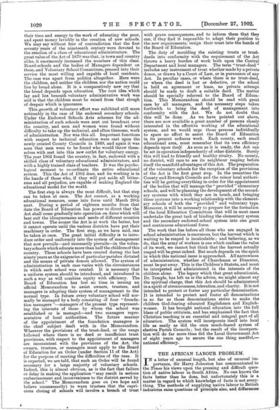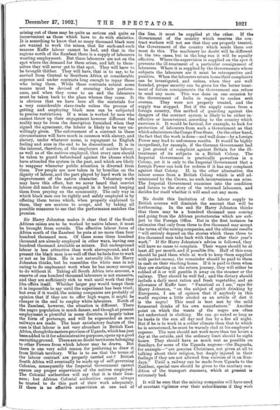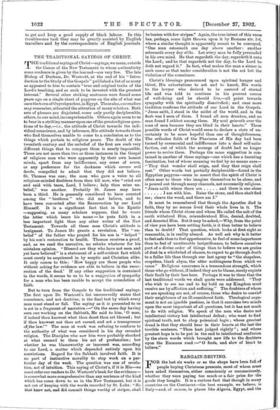THE AFRICAN LABOUR PROBLEM.
TN a letter of unusual length, but also of unusual im- portance, Sir Harry Johnston has communicated to the Times his views upon the pressing and difficult ques- tion of native labour in South Africa. No one knows the facts better than he does, but unfortunately this is a matter in regard to which knowledge of facts is not every- thing. The methods of supplying native labour to British industries raise questions of principle also, and differences arising out of these may be quite as serious and quite as inconvenient as those which have to do with statistics. It is something to know that so many thousand black men are wanted to work the mines, that for such-and-such reasons Kaffir labour cannot be had, and that in the regions north of the Zambesi there is a supply of labourers wanting employment. But these labourers are not on the spot where the demand for them arises, and left to them- selves they will never get to that spot. They will have to be brought thither. They will have, that is to say, to be carried from Central to Southern Africa at considerable expense and. under contracts long enough to repay those who bring them. While these contracts subsist some means must be devised of ensuring their perform- ance, and when they come to an end the labourers must be taken back to the place whence they came. It is obvious that we have here all the materials for a very considerable slave-trade unless the process of getting and employing black men can be subjected to precise restrictions. If a mine is worked by men who cannot throw up their engagement however different the reality may be from the description furnished when they signed the agreement, the labour is likely to be very un- willingly given. The enforcement of a contract in these circumstances will have much in common with slavery, and slavery, under whatever name, is repugnant to English feeling and sure in the end to be discontinued. It is in the interest, therefore, of the employers of native labour, as well as of the natives employed, that every care should be taken to guard beforehand against the abuses which have attended the system in the past, and which are likely to reappear whenever public attention is diverted from them. Few people are now taken in by homilies on the dignity of labour, and the part played by hard work in the improvement of the native character. Voluntary work may have this effect, but we never heard that convict labour did much for those engaged in it beyond keeping them from preying on the community. The only way in which black men can be rightly and safely employed is by offering them terms which, when properly explained to them, they are anxious to accept, and by taking all possible measures to see that the performance matches the promise.
Sir Harry Johnston makes it clear that if the South African mines are to be worked by native labour, it must be brought from outside. The effective labour force of Africa south of the Zambesi he puts at no more than four hundred thousand men. Of these some three hundred thousand are already employed in other ways, leaving one hundred thousand available as miners. But underground labour is less attractive than work aboveground, and at present the black man is so well off that he feels free to work or not as he likes. He is not naturally idle, Sir Harry Johnston thinks, but he resembles the white man in not caring to do unpleasant work when he has money enough to do without it. Taking all South Africa into account, a reserve of one hundred thousand labourers is not excessive, and they are sufficiently rich to wait until work that they like offers itself. Whether larger .pay would tempt them it is impossible to say until the experiment has been tried; but even if it -would, the mining companies are probably of opinion that if they are to offer high wages, it might be cheaper in the end to employ white labourers. North of the Zambesi, however, the situation is different. There the negro population is much denser, and though at pre. sent employment is plentiful in some districts, it largely takes the form of porterage, and will be superseded as more railways are made. The least satisfactory feature of the case is that labour is not very abundant in British East Africa, though the eastern province of Uganda, which has just been added to it for administrative purposes, opens up a good recruiting ground. There are no doubt territories belonging to other Powers from which labour may be drawn. But there is one very solid reason for preferring to draw it from British territory. Who is to see that the terms of the labour contract are properly carried out ? British South Africa will eventually be made up of self-governing Colonies, consequently the Imperial Government cannot ensure any proper supervision of the natives employed. The Colonial authorities will say that it is their busi- ness; but African Colonial authorities cannot always be trusted to do this part of their work adequately. If there is no effective supervision at one end of the line, it must be supplied at the other. If the Government of the country which receives the con- tract workers will not see that they are properly treated, the Government of the country which sends them out must do this. The machinery no doubt will be different in the two cases, but in the long run it will be equally effective. Where the supervision is supplied on the spot it prevents the ill-treatment of a particular consignment of labourers. Where it is supplied by the Governments whose subjects the labourers are it must be retrospective and punitive. When the labourers return home their complaints can be investigated, and unless, when they are well founded, proper security can be given for the better treat- ment of future consignments the Government can refuse to send any more. This was done on one occasion by the Government of India in regard to coolies sent oversea. They were not properly treated, and the supply was stopped. But if the supply comes from a foreign country, this method of guarding against the dangers of the contract system is likely to be either in- effective or inconvenient, according to the country which exercises it. It would be farcical, for example, to look for protection of labourers from such a. Government as that which administers the Congo Free State. On the other hand, the fact that the work is done—and well done—by a foreign Power may lead to unforeseen results. It would be highly inexpedient, for example, if the German Government had a just ground of complaint against Britain for the ill- treatment of its subjects in a British Colony. The Imperial Government is practically powerless in a Colony, yet it is only to the Imperial Government that a foreign Power can look for redress if it has any complaint against that Colony. ■ If, in the other alternative, the labour comes from a British Colony which is still ad- ministered by the Crown, no such inconvenience can arise. The Imperial Government examines into the condition and listens to the story of the returned labourers, and decides for itself whether it will send out any more.
No doubt this limitation of the labour supply to British sources will diminish the amount that will be forthcoming. In the end Sir Harry Johnston thinks that there may be a hundred thousand men coming and going from the African protectorates which are sub- ject to the Foreign Office. But in the first instance he estimates that only from three to five thousand may accept the terms of the mining companies, and the ultimate results "will entirely depend on the stories which these three to five thousand men take back with them after their year's work." If Sir Harry Johnston's advice is followed, they will have no cause to complain. Their wages should be at least £1 per month, and if possible 30s. Half of this sum should be paid them while at work to keep them supplied with pocket-money, the remainder should be paid to them in cash on their reaching home. If it is paid to them when they are starting on the return journey, they will either be robbed of it or will gamble it away on the steamer or the railway. They should be well fed ; and the dietary should include a daily meat ration and fresh vegetables, and an allowance of Kaffir beer. "Fanatical as I am," says Sir Harry Johnston, "on the subject of spirit drinking by Europeans, I am of opinion that if anybody in this world requires a little alcohol as an article of diet it is the negro! This need is best met by the mild fermented drinks of his own manufacture." Another point on which the wants ef the negro are often not understood is clothing. He can go naked so long as he basks in the sun all day and lies by a fire all night. But if he is to work in a colder climate than that to which he is accustomed, he must be warmly clad at his employer's expense. The men should not work more than ten hours a day at the outside, and the ordinary limit should be eight hours. They should have as much rest as possible on Sundays, for some of the Uganda negroes—the Baganda, for example—" are genuine Christians, not given at all to talking about their religion, but deeply injured in their feelings if they are not allowed free exercise of it on Sun- days." Until a railway can be made from Uganda to the Zatibesi, special care should be given to the sanitary con- dition of the transport steamers, which at present is extremely bad.
It will be seen that the mining companies will have need, of constant vigilance over their subordinates if they wish to get and keep a good supply of black labour. In this troublesome task they may be greatly assisted by English travellers and by the correspondents of English journals.








































 Previous page
Previous page